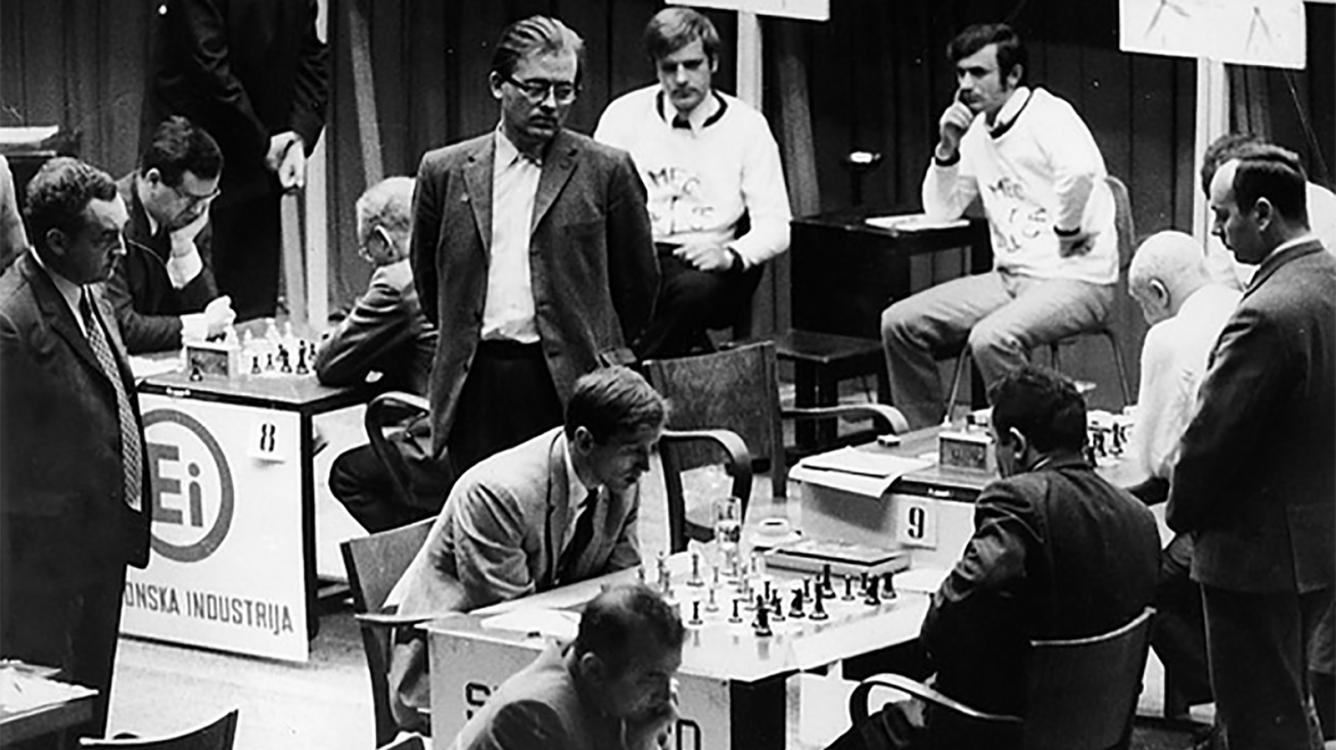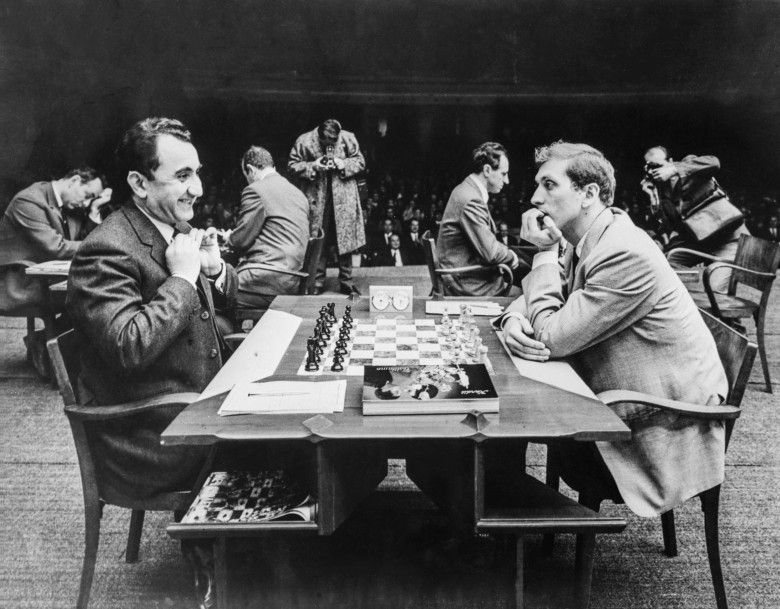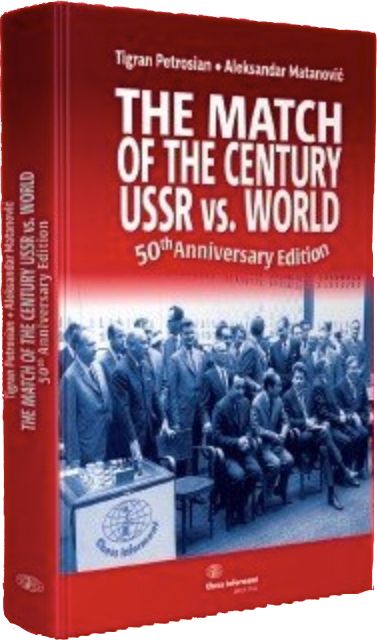
50 Years Ago Today, USSR-Rest Of The World Started
Today, half a century ago, one of the greatest chess events of the 20th century started in Belgrade, Yugoslavia. Virtually all of the top players in the world participated in this match between the Soviet Union and the Rest of the World.
The event was repeated two more times in later years, but never on the same level, and it never again spoke to the imagination quite as much as the first event. The 1970 match USSR vs Rest of the World, "an epoch-making battle" in the words of GM Garry Kasparov, had virtually all the top players—including GM Bobby Fischer—together for one week in Belgrade, the capital of what was then Yugoslavia.
Video footage of the event (without sound).
Fischer's participation in this event (or in any event, in fact) was far from automatic. In his "My Great Predecessors IV," Kasparov tells a story about how the American player, who would become world champion two years later, initially hesitated.
According to Bobby, he was persuaded by the chief arbiter Bozidar Kazic: "He flew to America and spent a long time trying to convince me. And suddenly he said: 'Think about it—If you don't play in the Match of the Century, it will simply be the greatest chess absurdity of the century!' It was hard for me to say anything in reply..."
The team match was held between March 29 and April 4, 1970 in the Great Hall of the Dom Sindikata (the House of Trade Unions) in Belgrade, witnessed by 2,000 spectators and 63 foreign correspondents.
Reportedly, the city lights on the square in front of the match hall were dimmed during the event, so that the outside spectators could better follow the games on what must have been one of the earliest versions of an electronic chessboard.
The match consisted of four rounds, with teams of 10 players each (including six world champions, past, present, and future!) playing four games against the same player.
The Soviet Team, in board order: Boris Spassky, Tigran Petrosian, Viktor Korchnoi, Lev Polugaevsky, Efim Geller, Vasily Smyslov, Mark Taimanov, Mikhail Botvinnik, Mikhail Tal, Paul Keres, and reserves Leonid Stein and David Bronstein.
The Rest of the World Team in board order: Bent Larsen, Fischer, Lajos Portisch, Vlastimil Hort, Svetozar Gligoric, Samuel Reshevsky, Wolfgang Uhlmann, Milan Matulovic, Miguel Najdorf, Borislav Ivkov, and reserves Fridrik Olafsson and Klaus Viktor Darga.
Fischer played on board two instead of board one—another interesting story. For the line-up of the teams, Arpad Elo's rating system (brand new at the time) had been used, but Larsen objected, claiming he deserved top board based on his recent results and Fischer's inactivity. Here's what happened after, also from Kasparov, who quotes Taimanov:
"This was an open challenge to Fischer, and it appeared that a conflict was inevitable," writes Taimanov. "But the unbelievable occurred! When Dr. [Max] Euwe—the team captain—went into Bobby's room, the latter was lying on a divan with his head buried in a pillow. And hardly had Euwe begun fulfilling his complicated diplomatic mission, when Bobby, not even turning to his respected colleague, barked out: 'I don't object...'"
Later it was concluded that Fischer, who hadn't played competitive chess for nearly two years, didn't feel fully ready yet to meet Spassky, and perhaps rightly so. He lost to Spassky later in the year at the Siegen Olympiad.

Characteristically, the Soviets prepared seriously for the event. They had taken up a training camp where leading trainers and theoreticians such as GM Isaac Boleslavsky and GM Semyon Furman were present. As the board order of the World was known to them (apart from the late Fischer/Larsen switch), it was decided to adjust the order of their line-up to increase chances in the individual mini-matches.
The USSR ended up winning the match by the narrowest of margins: 20.5-19.5. It could well have been a tie had Portisch not allowed a threefold repetition in a promising position against Korchnoi on the last day.
Another key game on the last day was the one between Smyslov and Olafsson (who substituted for Reshevsky). In what was the last game that was still going, Smyslov won. He later wrote:
"The final result depended completely on us. To make a draw would mean a draw in the match as a whole. Were I to win, we would win. Were Olafsson to win… Imagine the situation?! (...) That’s why I at once told everyone that this victory remains for me one of the most memorable; in terms of its intensity, it can only be compared with the one that made me world champion."
It was a disappointing result for the mighty Soviets, especially when one took into account that they had clearly lost the battle on the top-four boards. Fischer won his mini-match with Petrosian with the highest individual score for the World (3-1), starting with two wins and then playing two draws.
| Board | USSR | rd1 | rd2 | rd3 | rd4 | Score | World | rd1 | rd2 | rd3 | rd4 | Score |
| 1 | Spassky | ½ | 1 | 0 | 1½/3 | Larsen | ½ | 0 | 1 | 1 | 2½/4 | |
| Stein | 0 | 0/1 | ||||||||||
| 2 | Petrosian | 0 | 0 | ½ | ½ | 1/4 | Fischer | 1 | 1 | ½ | ½ | 3/4 |
| 3 | Korchnoi | ½ | ½ | 0 | ½ | 1½/4 | Portisch | ½ | ½ | 1 | ½ | 2½/4 |
| 4 | Polugaevsky | 0 | ½ | ½ | ½ | 1½/4 | Hort | 1 | ½ | ½ | ½ | 2½/4 |
| 5 | Geller | 1 | ½ | ½ | ½ | 2½/4 | Gligoric | 0 | ½ | ½ | ½ | 1½/4 |
| 6 | Smyslov | ½ | 1 | 0 | 1 | 2½/4 | Reshevsky | ½ | 0 | 1 | 1½/3 | |
| Olafsson | 0 | 0/1 | ||||||||||
| 7 | Taimanov | 1 | 1 | ½ | 0 | 2½/4 | Uhlmann | 0 | 0 | ½ | 1 | 1½/4 |
| 8 | Botvinnik | 1 | ½ | ½ | ½ | 2½/4 | Matulovic | 0 | ½ | ½ | ½ | 1½/4 |
| 9 | Tal | ½ | 0 | 1 | ½ | 2/4 | Najdorf | ½ | 1 | 0 | ½ | 2/4 |
| 10 | Keres | ½ | 1 | ½ | 1 | 3/4 | Ivkov | ½ | 0 | ½ | 0 | 1/4 |
| Totals | 5½ | 6 | 4 | 5 | 20½ | Totals | 4½ | 4 | 6 | 5 | 19½ |
(On the last day, Stein played for Spassky who was ill, while Olafsson played for Reshevsky for religious reasons.)
Naturally, the event produced a lot of excellent games. The most famous is the encounter between Larsen and Spassky from the second day of the match. Starting with 1.b3, the great Dane was wiped off the board in just 17 moves, with Black's h-pawn playing a major role.
Here's the game with annotations by Chess.com's @SamCopeland, who also recorded a video that can be found on his blog.
Here's the first of Fischer's two wins against Petrosian. According to a report by Dragoslav Andric in "Chess Life & Review" (June 1970), the players played on a chess table different from the rest.
"Made of white and green marble, it was Fidel Castro's gift (on the occasion of the Olympiad in Havana in 1966) to one of Belgrade's chess functionaries. The chess set, too, had to be special—Fischer demanded that it not be too shiny."
Here's the game, with brief annotations from the players taken from the tournament bulletin.

As Larry Evans, Fischer's second at the event, wrote in "Sports Illustrated" (April 20, 1970), among the prizes were two cars:
Among the prizes were two automobiles—a Fiat for the winner at the first board and a Russian-built Moskvich at the second. "All I need is another half-point to win the Moskvich," Fischer said. I was acting as Fischer's second, and this comment told me that the days of hard trying were over; he was going to play it safe. And he did. The game was drawn. Since he does not like to drive he said he was going to sell the car. European chess masters told him not to do it and said it was a fine car, except that it could not always be depended upon to run uphill.
The prize for the best game was awarded to Geller for his win against Gligoric on the first day. Here it is with annotations from the tournament bulletin.

Part of this article was based on Douglas Griffin's recent blog post. Griffin (from Insch, Aberdeenshire, Scotland) was an active chess player in the 1980s and has a keen interest in the history and (especially Russsian-language) literature of the game.
Currently, Griffin is working on a redesigned and extended version of the original tournament book in the English language in collaboration with Chess Informant. He kindly provided the following decisive game with the annotations as they will appear in the book.

